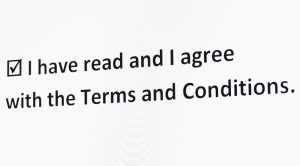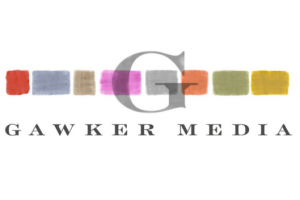Six Ways Site Design Can Potentially Render TOS Agreements Unenforceable
Our recent posts on successful legal challenges to the arbitration clauses in browsewrap and clickwrap agreements have a theme in common—even the most thorough and well-worded agreement can be rendered unenforceable by website design. With this in mind, we have put together a list of otherwise innocuous web design components that can be the bane of both browsewrap and clickwrap alike. Note, failure to pay attention to any one of these will not necessarily render your agreement weightless—many of these are culprits only when grouped together—but they are also each eminently addressable, so why not avoid potential pitfalls in the first place?
Clickwrap Kryptonite: Don’t Let Site Design Undermine Your TOS
 We previously covered the developing legal issues with browsewrap agreements and the importance of reviewing and updating any such agreement to ensure users are bound to the terms. In a browsewrap agreement, the user’s assent to the agreement’s terms is inferred from the user’s use of the website. Often, the terms of a browsewrap agreement are accessible from a hyperlink placed on one or more webpages of the company’s website. As we mentioned in our initial post, browsewrap agreements have a close, usually more dependable relative—the “clickwrap” agreement. A clickwrap agreement requires the user to click a button to affirm assent to the agreement’s terms. As a result of this direct, affirmative action, many lawyers view clickwrap as a safer alternative than its browsewrap cousin.
We previously covered the developing legal issues with browsewrap agreements and the importance of reviewing and updating any such agreement to ensure users are bound to the terms. In a browsewrap agreement, the user’s assent to the agreement’s terms is inferred from the user’s use of the website. Often, the terms of a browsewrap agreement are accessible from a hyperlink placed on one or more webpages of the company’s website. As we mentioned in our initial post, browsewrap agreements have a close, usually more dependable relative—the “clickwrap” agreement. A clickwrap agreement requires the user to click a button to affirm assent to the agreement’s terms. As a result of this direct, affirmative action, many lawyers view clickwrap as a safer alternative than its browsewrap cousin.
How Binding Is Your Browsewrap Agreement?
Anyone who has purchased a product online or downloaded software for a computer, tablet or mobile device has likely encountered “browsewrap” and “clickwrap” agreements. Such agreements are the bread and butter of companies that sell or license products or provide services via websites or web applications. Clickwrap agreements require a user to affirmatively click a button to affirm his or her assent to the agreement’s terms, whereas with a browsewrap agreement, the user’s assent to the agreement’s terms is inferred from the user’s use of the website. (Often, the terms of a browsewrap agreement are accessible from a hyperlink placed on one or more webpages of the company’s website.)
Hulk Hogan’s Legal Leg Drop Sets Precedent for Celebrity Journalism
 Famed wrestler Hulk Hogan’s $140 million trial verdict against Gawker Media for publishing a tape of him having relations with his best friend’s wife and using racially offensive language, sends a clear message that despite the proliferation of Internet journalism, social media, paparazzi, and the 24 hour news cycle, celebrities are still entitled to privacy in their most intimate moments—at least for now.
Famed wrestler Hulk Hogan’s $140 million trial verdict against Gawker Media for publishing a tape of him having relations with his best friend’s wife and using racially offensive language, sends a clear message that despite the proliferation of Internet journalism, social media, paparazzi, and the 24 hour news cycle, celebrities are still entitled to privacy in their most intimate moments—at least for now.
LinkedIn Grapples with the Ripples of a 2012 Data Breach
Last week on the official LinkedIn blog, the company’s chief information security officer, Cory Scott, reported the company had become aware of an additional set of data that has just been released consisting of e-mail and hashed password combinations of more than 100 million LinkedIn members. This recent release is related to a 2012 unauthorized access and disclosure of LinkedIn members’ passwords:
Yesterday, we became aware of an additional set of data that had just been released that claims to be email and hashed password combinations of more than 100 million LinkedIn members from that same theft in 2012. We are taking immediate steps to invalidate the passwords of the accounts impacted, and we will contact those members to reset their passwords. We have no indication that this is as a result of a new security breach. –Linkedin Official Blog, May 18, 2016
The CFPB’s Take on Arbitration Provisions Is Not a Friendly One
It’s no secret that the Consumer Financial Protection Bureau (CFPB) views arbitration agreements in contracts between financial services providers and consumers rather unfavorably. This antipathy has been maintained even after a 2011 Supreme Court decision (ATT Mobility LLC v. Concepcion) affirming the practice. Back in October, the bureau announced its consideration of a proposed rule that would prohibit this practice in some cases, and in other cases, require companies that use arbitration clauses to report information regarding claims filed and awards issued to the CFPB. On May 5th, the CFPB released the proposed rule.
In their client alert, Arbitration Provisions Mauled by Consumer Watchdog, colleagues Christine Scheuneman, Amy Pierce and Andrew Caplan examine the rule in depth, pointing out some of its contradictions and areas in which the proposed rule may be susceptible to (the inevitable) legal challenges that will follow.
Say Yes to the Redress: A Potential Shift in Copyright Law May Arm the Fashion Police
Until recently, social media has been one of the only recourses for fashion designers and labels that have had their designs knocked off. Take the Acquazurra “Wild Thing” sandal, for example. Acquazzura is a high-end shoe brand that designed and released the $785 sandal, identifiable by its “wild” fringe on the toes. Shortly after, Ivanka Trump released the “Hettie” sandal, an almost identical shoe which, priced at $145, was almost $600 less expensive.
News of Note for the Internet-Minded – 5/12/16
AI teaching assistants and the NBA’s interest in VR aside, this week’s roundup has plenty of darker-themed stories, including torture-proof passwords, live-streamed suicide and death while AR gaming.
Joint Commission Ends Ban on the Texting of Physician Orders
In the Joint Commission Perspectives May 2016 edition, the Commission reversed its 2011 position prohibiting clinician texting of patient orders within accredited health care institutions, stating technological advancements now allow for secure transmission. The Joint Commission first issued its ban in 2011 by posting an often overlooked response to the frequently asked question regarding the by then ubiquitous communication tool: “[I]t is not acceptable for physicians or licensed independent practitioners to text orders for patients to the hospital or other healthcare setting. This method provides no ability to verify the identity of the person sending the text and there is no way to keep the original message as validation of what is entered into the medical record.”  While the Commission did not have a specific policy against electronic communications, its FAQ response highlighted concerns surrounding texting’s privacy, security, reliability and record retention shortcomings. Following FAQ response’s posting, institutions accredited by the Commission were expected to comply with the texting ban on clinical orders. However, recent studies have shown that permitting the texting of orders within health systems could significantly increase hospital efficiencies and reduce the length of patient stays.
While the Commission did not have a specific policy against electronic communications, its FAQ response highlighted concerns surrounding texting’s privacy, security, reliability and record retention shortcomings. Following FAQ response’s posting, institutions accredited by the Commission were expected to comply with the texting ban on clinical orders. However, recent studies have shown that permitting the texting of orders within health systems could significantly increase hospital efficiencies and reduce the length of patient stays.






